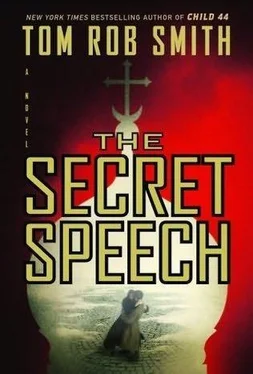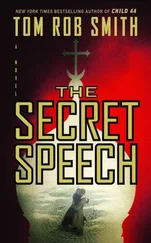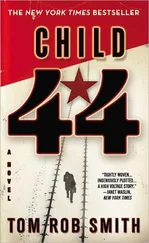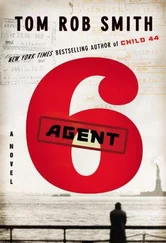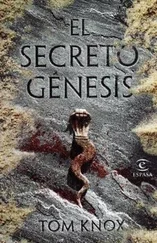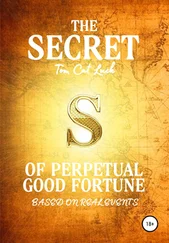Tom Smith - Secret speech
Здесь есть возможность читать онлайн «Tom Smith - Secret speech» весь текст электронной книги совершенно бесплатно (целиком полную версию без сокращений). В некоторых случаях можно слушать аудио, скачать через торрент в формате fb2 и присутствует краткое содержание. Жанр: Триллер, на английском языке. Описание произведения, (предисловие) а так же отзывы посетителей доступны на портале библиотеки ЛибКат.
- Название:Secret speech
- Автор:
- Жанр:
- Год:неизвестен
- ISBN:нет данных
- Рейтинг книги:5 / 5. Голосов: 1
-
Избранное:Добавить в избранное
- Отзывы:
-
Ваша оценка:
- 100
- 1
- 2
- 3
- 4
- 5
Secret speech: краткое содержание, описание и аннотация
Предлагаем к чтению аннотацию, описание, краткое содержание или предисловие (зависит от того, что написал сам автор книги «Secret speech»). Если вы не нашли необходимую информацию о книге — напишите в комментариях, мы постараемся отыскать её.
Secret speech — читать онлайн бесплатно полную книгу (весь текст) целиком
Ниже представлен текст книги, разбитый по страницам. Система сохранения места последней прочитанной страницы, позволяет с удобством читать онлайн бесплатно книгу «Secret speech», без необходимости каждый раз заново искать на чём Вы остановились. Поставьте закладку, и сможете в любой момент перейти на страницу, на которой закончили чтение.
Интервал:
Закладка:
Tom Rob Smith
Secret speech
SOVIET UNION ,MOSCOW, 3 JUNE 1949
During The Great Patriotic War he’d demolished the bridge at Kalach in defense of Stalingrad, rigged factories with dynamite, reducing them to rubble, and set indefensible refineries ablaze, dicing the skyline with columns of burning oil. Anything that might have been requisitioned by the invading Wehrmacht he’d rushed to destroy. While his fellow countrymen wept as hometowns crumbled around them, he’d surveyed the devastation with grim satisfaction. The enemy would conquer a wasteland, burnt earth and a smoke-filled sky. Often improvising with whatever materials were at hand-tank shells, glass bottles, siphoning gasoline from abandoned, upturned military trucks-he’d gained a reputation for being a man the State could rely on. He never lost his nerve, never made a mistake even when operating in extreme conditions: freezing winter nights, waist deep in fast-flowing rivers, his position coming under enemy fire. For a man of his experience and temperament, today’s job should be routine. There was no urgency, no bullets whistling overhead. Yet his hands, renowned as the steadiest in the trade, were trembling. Drops of sweat rolled into his eyes, forcing him to dab them with the corner of his shirt. He felt sick, a novice again, as this was the first time that fifty-year-old war hero Jekabs Duvakin had ever blown up a church.
There was one more charge to be set, directly before him, positioned in the sanctuary where the altar had once stood. The bishop’s throne, icons, menalia-everything had been removed. Even the gold leaf had been scraped from the walls. The church stood empty except for the dynamite dug into the foundations and strapped to the supporting columns. Pillaged and picked clean, it remained a vast and awesome space. The central dome, mounted with a crown of stained-glass windows, was so tall and filled with so much daylight that it seemed as if it were part of the sky. Head arched back, mouth open, Jekabs admired the dome’s peak some fifty meters above him. Rays of sunlight entered through the high windows, illuminating frescoes that were soon to be blasted apart, broken down into their constituent parts: a million specks of paint. The light spread across the smooth stone floor not far from where he sat as if trying to reach out to him, an outstretched golden palm.
He muttered:
– There is no god.
He said it again, louder this time, the words echoing inside the dome:
– There is no god!
It was a summer’s day; of course there was light. It wasn’t a sign of anything. It wasn’t divine. The light meant nothing. He was thinking too much, that was the problem. He didn’t even believe in God. He tried to recall the State’s many antireligious phrases.
Religion belonged in an age where every man was for himself And God was for every man.
This building wasn’t sacred or blessed. He should see it as nothing more than stone, glass, and timber-dimensions one hundred meters long and sixty meters wide. Producing nothing, serving no quantifiable function, the church was an archaic structure, erected for archaic reasons by a society that no longer existed.
Jekabs sat back, running his hand along the cool stone floor smoothed by the feet of many hundreds and thousands of worshippers who’d been attending services for many hundreds of years. Overwhelmed by the magnitude of what he was about to do, he began to choke as surely as if there was something stuck in his throat. The sensation passed. He was tired and overworked-that was all. Normally on a demolition project of this scale he’d be assisted by a team, the workload shared. In this instance he’d decided his men could play a peripheral role. There was no need to divide the responsibility, no need to involve his colleagues unnecessarily. Not all of them were as clear-thinking as he was. Not all of them had purged themselves of religious sentiments. He didn’t want men with conflicted motivation working alongside him.
For five days, starting at sunrise, finishing at sunset, he’d laid every charge-explosives strategically positioned to ensure the structure collapsed inwards, the domes falling neatly on top of themselves. Far from demolition being chaotic, there was order and precision to his craft and he was proud of his particular skill. This building presented a unique challenge. It wasn’t a moral question but an intellectual test. With a bell tower and five golden cupolas, the largest of which was supported on a tabernacle eighty meters high, today’s controlled, successful demolition would be a fitting conclusion to his career. After this, he’d been promised an early retirement. There’d even been talk about him receiving the Order of Lenin, payment for a job no one else wanted to do.
He shook his head. He shouldn’t be here. He shouldn’t be doing this. He should’ve feigned sickness. He should’ve forced someone else to lay the final charge. This was no job for a hero. But the dangers of avoiding work were far greater, far more real than some superstitious notion that this work might be cursed. He had his family to protect-a wife, a daughter-and he loved them very much.
Lazar stood among the crowd, held back from the perimeter of the Church of Sancta Sophia at a precautionary distance of a hundred meters, his solemnity contrasting with the excitement and chatter of those around him. He decided that they were the kind of crowd that might have attended a public execution, not out of principle, but just for the spectacle, just for something to do. There was a festive atmosphere, conversations bubbling with anticipation. Children bounced on their fathers’ shoulders, impatient for something to happen. A church was not enough for them: the church needed to collapse for them to be entertained.
At the front of the barricade on a specially constructed podium to provide elevation, a film crew were busy setting up tripods and cameras-discussing which angles to best capture the demolition. Particular attention was paid to ensure they caught all five cupolas, and there was earnest speculation as to whether the timber domes would smash in the air as they crashed into each other or not until they hit the ground. It would depend, they reasoned, on the skill of the experts laying the dynamite inside.
Lazar wondered if there could be sadness too among the crowd. He looked left and right, searching for like-minded souls-the married couple in the distance, both of them silent, their faces drained of color, the elderly woman at the back, her hand in her pocket. She had some item hidden in there, a crucifix perhaps. Lazar wanted to divide this crowd, to separate the mourners from the revelers. He wanted to stand beside those who appreciated what was about to be lost: a three-hundred-year-old church. Named and designed after the Cathedral of Sancta Sophia in Gorky, it had survived civil wars, world wars. The recent bomb damage was a reason to preserve, not to destroy. Lazar had contemptuously read the article published in Pravda claiming structural instability. Such a claim was nothing more than a pretext, a spoonful of false logic to make the deed palatable. The State had ordered the church’s destruction, and what was worse, far worse, was that the order had been made in agreement with the Orthodox Church. Both parties to this crime claimed it was a pragmatic decision, not an ideological one. They’d listed a series of contributing factors: damage by Luftwaffe raids. The interior required elaborate renovations that couldn’t be paid for. Furthermore, the land in the heart of the city was needed for a crucial construction project. Everyone in a position of power was in agreement. This church, hardly one of Moscow’s finest, should be torn down.
Cowardice lay behind the shameful arrangement. The ecclesiastical authorities, having rallied every church congregation behind Stalin during the war, were now an instrument of the State, a ministry of the Kremlin. This demolition was a demonstration of that subjugation. They were blowing it up for no reason other than to prove their humility: an act of self-mutilation to testify that religion was harmless, docile, tamed. It didn’t need to be persecuted anymore. Lazar understood the politics of sacrifice: wasn’t it better to lose one church than to lose them all? As a young man he’d witnessed theological seminaries turned into workers’ barracks, churches turned into antireligious exhibition halls. Icons had been used as firewood, priests imprisoned, tortured, and executed. Continued persecution or thoughtless subservience: that had been the choice.
Читать дальшеИнтервал:
Закладка:
Похожие книги на «Secret speech»
Представляем Вашему вниманию похожие книги на «Secret speech» списком для выбора. Мы отобрали схожую по названию и смыслу литературу в надежде предоставить читателям больше вариантов отыскать новые, интересные, ещё непрочитанные произведения.
Обсуждение, отзывы о книге «Secret speech» и просто собственные мнения читателей. Оставьте ваши комментарии, напишите, что Вы думаете о произведении, его смысле или главных героях. Укажите что конкретно понравилось, а что нет, и почему Вы так считаете.
